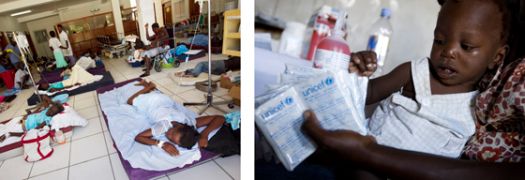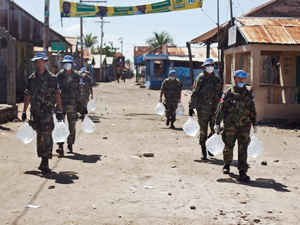Haitian cholera victims sue United Nations
By Saeed Shabazz -Staff Writer- | Last updated: Dec 6, 2011 - 6:24:56 PMWhat's your opinion on this article?

(l)Patients with cholera lie on mats at the crowded St. Nicholas Hospital in Saint Marc, in the Artibonite
region of Haiti, where Cuban doctors and doctors with Médecins Sans Frontières are treating those
infected. Saint Marc is at the epicentre of a cholera outbreak which has so far claimed 250 lives and
affected around 2,500 people in Artibonite. (r)A child at the health center in Grand Dessalines receives oral re-hydration salts being administered by
the United Nations Children's Fund (UNICEF) and the French NGO Acted during the cholera outbreak
in Haiti. Photos: www.unmultimedia.org
|
UNITED NATIONS (FinalCall.com) - The United Nations has yet to respond to a 37-page petition on behalf of 5,000 Haitian cholera victims that seeks financial compensation, an apology, medical treatment for victims, clean water and better sanitation infrastructure.
According to the “Petition for Relief” lawyers filed in New York and Haiti, the Oct. 10, 2010 cholera outbreak in Haiti infected nearly 500,000 people, and caused the deaths of nearly 7,000. More claims could also be filed.
The petition, delivered to the UN Secretary-General Nov. 3 and to the Claims Unit Chief at the UN Stabilization Mission in Haiti (MINUSTAH) in Port-au-Prince, accuses the world body and its Department of Peacekeeping of “reckless failure in containing the outbreak, gross negligence and deliberate indifference” for the health and lives of Haitians.
“The sickness, death and harm from cholera suffered by Haiti’s citizens are a product of the UN’s multiple failures,” charges the petition.

Argentinean peacekeepers with the UN Stabilization Mission in Haiti (MINUSTAH) carry containers of water into the town
of Grande Saline, in Haiti’s Artibonite region. Due to its isolated, coastal location, the town was badly affected by a recent
cholera outbreak and was in dire of need of clean water and medical care. Photos: www.unmultimedia.org
|
A spokesperson for UN Secretary General Ban Ki-Moon told reporters Nov. 8 the petition was under review by several UN departments and had no further comment.
“This case is too big to fail because the evidence against the UN is overwhelming,” attorney Brian Concannon, Jr. told reporters at the UN during a press conference. Mr. Concannon is executive director of the Boston-based Institute for Justice and Democracy.
In an interview, the activist lawyer admitted his clients have an “uphill fight” since the UN has claimed immunity in such manners. “The UN has a history of never holding themselves to their own rules,” Mr. Concannon said, adding, “I fear a UN cover up!”
The petition cites a 2004 “Status of Force Agreement,” between the UN and the government of Haiti. A “SOFA,” as it is called, is generally the framework under which armed forces operate in a foreign nation. SOFAS like the one signed in Haiti include provisions that address criminal jurisdiction over military personnel.
The SOFA for Haiti also states MINUSTAH shares responsibility for operations “with respect to sanitary services” and the UN is to establish a claims commission to handle third party complaints “over which the courts of Haiti do not have jurisdiction.” The UN admits it has not set up the commission.
The SOFA requires third party claims for “property loss or damage for personal injury, illness or death arising from or directed attributed to MINUSTAH” must be submitted within six months to the UN to be settled, before going to an outside court. Some say this explains why the petition was filed with the UN, however, a statute of limitation is also on the horizon.
Other researchers concluded the peacekeepers based at a camp near Mirebalais in northern Haiti, brought a strain cholera to into the area. The Nepalese allowed untreated fecal matter and other waste into a tributary that feeds into the Artibonite River, a major water source, said activists and an Associated Press report.
Cholera is a disease transmitted when bacteria-contaminated human fecal matter gets into water, food or onto someone’s hands. It causes severe diarrhea, vomiting and death within hours through dehydration.
The petition requests UN compensation of $100,000 for families of deceased Haitians and $50,000 for each of the Haitians who were infected.
Attorney Roger Wareham of the December 12th Movement told The Final Call he hadn’t read the petition, but was glad to see someone was calling the UN out on the cholera issue.
Haitian activist attorney Erzili Danto, founder of the Conn-based Haitian Lawyers Legal Network, “was glad to see that some legal action had begun against the UN concerning the cholera epidemic.”
Most of the petitioners live in Mirebalais, St. Marc, Hinche and Port-au-Prince. According to the petition the group includes farmers, teachers and caretakers whose injuries and deaths have left families without means.
Lawyers for the Bureau des Avocats Internationaux filed the petition in Haiti.
Activists said Haitian President Michel Martelly has not acknowledged any link between the UN and the cholera epidemic since taking office in April.
Related news:
Ezili Danto and Nation of Islam Bring Purified Water to Thousands in Haiti (Defend.HT, 08-16-2011)
Nation of Islam purchases water purification unit for Haiti (FCN, 01-11-2011)
A concrete way to provide long-term support for Haiti (FCN, 11-17-2010)
Fears UN caused cholera outbreak in rural Haiti (FCN, 11-13-2010)
INSIDE STORIES AND REVIEWS
-
-
About Harriett ... and the Negro Hollywood Road Show
By Rabiah Muhammad, Guest Columnist » Full Story -
Skepticism greets Jay-Z, NFL talk of inspiring change
By Bryan 18X Crawford and Richard B. Muhammad The Final Call Newspaper @TheFinalCall » Full Story -
The painful problem of Black girls and suicide
By Charlene Muhammad -National Correspondent- » Full Story -
Exploitation of Innocence - Report: Perceptions, policies hurting Black girls
By Charlene Muhammad -National Correspondent- » Full Story -
Big Ballin: Big ideas fuel a father’s Big Baller Brand and brash business sense
By Bryan Crawford -Contributing Writer- » Full Story






 Click Here Stay Connected!
Click Here Stay Connected!








